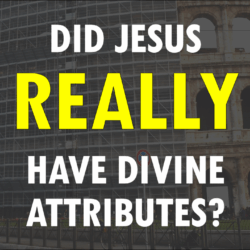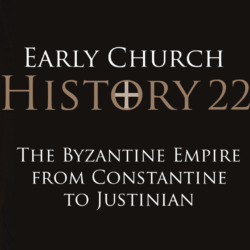Kermit Zarley was a professional golfer who had an interest in studying the Bible about the end times when he came across a disturbing verse. Reading Jesus’s words in the Olivet Discourse, he noticed that only the Father knew the day and hour of the end. Neither the angels nor the son of God were privy to it. As a good trinitarian evangelical, Zarley was familiar with the dual natures idea, but just couldn’t square that with the scripture. If Jesus was God in his being, he knew everything. Why did he say he didn’t know the time of the end? Surely, Jesus couldn’t be lying! This conundrum set Zarley down a path of research and investigation for many years until he slowly uncovered a different way of understanding Christ. Although he knew going public with his new belief would result in ostracism and rejection, he went ahead with it anyhow. This is his story.
Listen to this episode on Spotify or Apple Podcasts
—— Links ——
- Take a listen to my previous interview with “Servetus the Evangelical” from 2009
- Get in touch with Kermit at kermitzarley.com
- Read his blog at Patheos
- Check out his books on Amazon
- See other testimonies of people who left the Trinity and came to believe in the biblical unitarian Jesus
- Get the transcript of this episode
- Support Restitutio by donating here
- Join our Restitutio Facebook Group and follow Sean Finnegan on Twitter @RestitutioSF
- Leave a voice message via SpeakPipe with questions or comments and we may play them out on the air
- Intro music: Good Vibes by MBB Attribution-ShareAlike 3.0 Unported (CC BY-SA 3.0) Free Download / Stream: Music promoted by Audio Library.
- Who is Sean Finnegan? Read Sean’s bio here







Interesting episode. I had known of his book but never got to read it. He brings up the whole dual nature theorizing regarding the day and the hour. Of course we all experience this immediately being brought up as some sort of supposed rebuttal. However, it would absolutely be a mistake to get dragged into the quagmire that is the hypostatic union. No, it’s not a strong argument, but to a trinitarian it’s convenient because it explains away Jesus being a human yet God and will probably remain adamant that it makes complete sense–won’t get you anywhere.
Rather, the way to avoid this whole mess altogether is to just read the whole verse:
“not even the angels of heaven, but My Father only.” Jesus’ Father only? OK, how many persons were there supposed to be in that trinity again? And how many know of this day and hour? So, one can debate without end Jesus’ supposed two natures, but what does this actually resolve if this “God the Spirit”–forgotten as always–remains ignorant, also? No trinitarian would argue God’s spirit to have two natures. The issue of supposed persons within God’s nature being ignorant of something whereas the Father is not remains regardless, and some theory of a hypostatic union can’t do anything about it.
Sure, it may, at first, only get people to consider a binity if they remain adamant about Jesus’ two natures, but once you understand not everything may be as you were once taught, at least this may create a more earnest mindset to reconsider the idea of Jesus being a person within a multipersonal God, also.
Regarding the whole Trump/Palestinian thing, I’ll just be really honest and say I find it kind of jarring to listed to. The evangelical world has its fair share of political nonsense going on, complete with “prophets” and all that, and I’m just glad to not be a part of it at all. One thing (among many) I thank the Anabaptists for.
And some of the YouTube comments were funny. Like 325 settled all this stuff. Sure, that’s why you’re commenting on this conversation in 2024. Well, at least it sounds like you got some proper engagement on your content, and that’s certainly a positive thing!
Very good point Mark! Yeshua himself left no room in his statement for any third person of the so-called triune godhead. He said, I don’t know, the angels don’t know, only the Father knows – only means him and nobody else. Where does a third person fit into that? And the dualism argument cannot be applied to the concept of the “Holy Spirit”. Great observation, sir! Thank you for that!